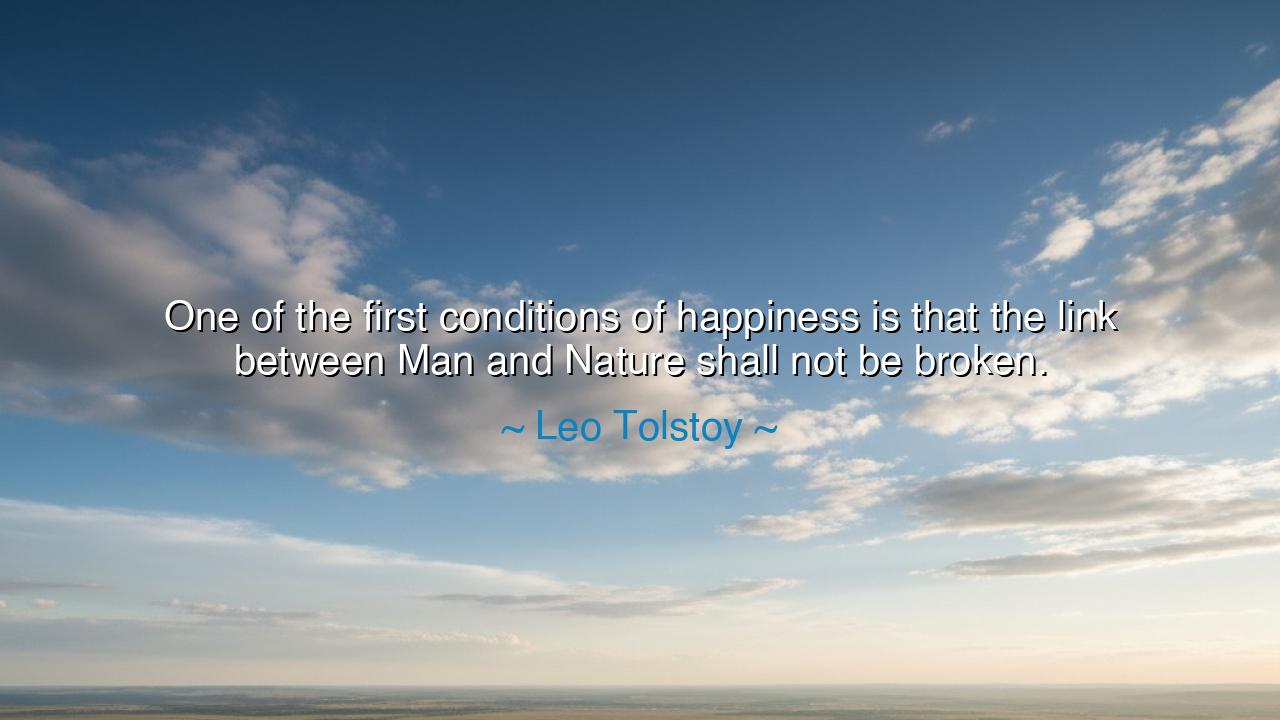
One of the first conditions of happiness is that the link between
One of the first conditions of happiness is that the link between Man and Nature shall not be broken.






When Leo Tolstoy wrote, “One of the first conditions of happiness is that the link between Man and Nature shall not be broken,” he was not merely speaking as a philosopher, but as a prophet of the heart. His words arise from a soul that had gazed long upon both the splendor and the sorrow of human life, and found that true happiness is not born in cities of stone, nor in the clamor of ambition, but in harmony with the earth itself. In these few, simple words, Tolstoy gives voice to an eternal truth: that Man is not above Nature, nor apart from it, but of it—and when that sacred bond is severed, both the body and the spirit wither.
Tolstoy, the great Russian novelist and moral thinker, spent much of his life in search of what he called “a rational faith.” Though he had written of kings, battles, and the hearts of men, in his later years he turned away from the noise of society to seek wisdom in the soil, the trees, and the rhythm of the seasons. He believed that Nature was not merely a backdrop to human life, but its foundation and teacher. In the simplicity of the field and the purity of the air, he saw what cities had forgotten: that happiness flows not from possession, but from connection—from the quiet knowledge that we are part of something vast, ancient, and alive.
The origin of Tolstoy’s insight lies in his own transformation. After the fame of War and Peace and Anna Karenina, he grew disillusioned with wealth and privilege. He found himself surrounded by luxury but starved of meaning. It was only when he returned to the land—walking barefoot in his fields, working beside the peasants, breathing the unspoiled air—that he rediscovered joy. He realized that modern life, with its machines and markets, had built walls between Man and Nature, and with those walls came emptiness. His heart, long burdened by questions of purpose, found its answer not in philosophy, but in the whisper of the wind and the quiet hum of the earth.
The ancients knew this truth well. The sages of every age—from the prophets of the East to the poets of the West—taught that Nature is not separate from the divine, but its visible face. The Stoics, like Marcus Aurelius, wrote that to live in accordance with Nature is to live in harmony with reason and virtue. The Taoist masters of China spoke of the Way, the eternal flow of the natural order that man must follow to find peace. And in the teachings of the Native peoples of the earth, the rivers, the mountains, and the winds are sacred kin, not resources to be conquered. Tolstoy’s wisdom stands in this same lineage—a cry to remember what civilization has begun to forget.
Consider the story of John Muir, the Scottish-American naturalist who wandered the wilderness of the Sierra Nevada. In the roaring waterfalls and the stillness of the pines, Muir found the face of God. He wrote, “In every walk with Nature, one receives far more than he seeks.” Like Tolstoy, he understood that happiness does not come from domination, but from communion. His efforts to protect Yosemite and establish national parks were not acts of politics, but of reverence. He saw that when we destroy the forests and poison the rivers, we do not merely harm the earth—we wound our own souls, for we and the earth are one.
Tolstoy’s warning is even more urgent in our time. The noise of machines drowns the song of birds; the glow of screens blinds us to the stars. We have mistaken progress for wisdom, and in our pursuit of comfort, we have drifted from the source of life itself. We feel restless, anxious, unfulfilled—yet what we lack is not something new, but something ancient. To heal ourselves, we must heal our bond with Nature. For she is not an ornament, nor an enemy, but a mother—patient, generous, and alive.
So, my children of the modern age, listen to the voice of Tolstoy. Step outside your walls and touch the living earth. Let the rain fall upon your skin without fear, let the wind speak to you in the language of freedom. Plant something—a tree, a garden, a seed of gratitude—and tend it with care. Walk not as a conqueror, but as a child returning home. For the heart that walks in harmony with Nature will never be truly poor, and the man who honors her will carry peace wherever he goes.
In the end, the link between Man and Nature is not merely a path to happiness—it is the lifeline of the soul. To forget it is to forget ourselves. But to restore it is to remember who we truly are: beings of earth and spirit, born from the same dust as the stars, breathing the same breath as all creation. And when that remembrance returns, we shall find, as Tolstoy did, that happiness is not something to be sought in the distance—it is already here, waiting, in the whisper of the leaves and the quiet pulse of the world beneath our feet.






AAdministratorAdministrator
Welcome, honored guests. Please leave a comment, we will respond soon